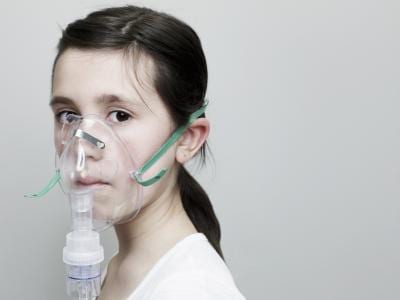The Centers for Disease Control and Prevention estimates that there are currently about 7 million children in the United States with asthma. This means that many parents are looking for the safest asthma medications for their children. While some natural treatments can be effective with asthma, more severe cases often require daily medication and rescue medication in the event of an asthma attack. There are two main types of asthma medications that are used. Anti-inflammatory medications reduce inflammation to prevent the airway from narrowing while brochodilators expand the air tubes.
Safest Rescue Asthma Medication
Asthma rescue medications help stop an asthma attack once it has already started so they are an essential part of asthma management in children. Rescue or quick relief asthma medications include albuterol, levalbuterol and pirbuterol. Rescue medications can be given by using an inhaler or a nebulizer. As with any medication, it is important to follow the recommended dosing instructions closely to avoid serious side effects. While there are some minor side effects associated with most rescue medications, the risk of a serious asthma attack outweighs the risk of side effects from the medication. It’s important to consult with your child’s pediatrician to be sure you are using the correct dose of the medications and that your child’s asthma is under control. If your child needs to use a rescue medication for his asthma more than a few times a week, his asthma may benefit from an additional medication to help control his symptoms.
Asthma Controller Medications
Many children with asthma need to go on a controller medication to keep their asthma symptoms under control. A controller medication is not used to replace a rescue medication. It is used to keep asthma symptoms under control so that the rescue medication is not needed as frequently. Controller medications are generally taken daily, whether your child is experiencing any asthma symptoms or not, to keep your child as symptom-free as much as possible. Controller medications include inhaled steroids, long-acting bronchodilators or medications that use a combination of the two. Inhaled steroids are safe in the recommended amounts, but many parents prefer to try other alternatives before having their child use those on a regular basis.
Oral Corticosteroids
Severe asthma attacks that do not respond to your child’s regular asthma treatment plan often need to be treated with oral corticosteroids. Oral corticosteroids have more side effects than most asthma medications and are not designed for long-term use, but in the event of a severe asthma attack they are often necessary to get asthma symptoms under control and help an asthmatic child breathe. Short-term use often has relatively few side effects. Longer term use of oral corticosteroids can include growth restriction, weak muscles, lower resistance to infection and high blood pressure. Children who have a frequent need for oral corticosteroids should be evaluated by a pediatrician or asthma specialist to determine what steps can be taken to safely control their asthma in the future.
Allergy Medications for Children with Asthma
Asthma and allergies often go hand-in-hand. Children with asthma often need to make sure their allergies are under control to control their asthma. Prescription allergy medication is often used to prevent allergy-related asthma attacks but over-the-counter allergy medication can be used as well. Asthmatic children may do better in certain climates, depending on what their allergies are. An allergy specialist can help determine exactly what your child’s allergies are and how to best control them. Many parents find that eating local honey can help reduce allergies in children. The National Honey Board is unable to substantiate claims that honey will improve allergies, but many parents report, first-hand, positive experience with its benefits.
Preventive Measures for Treating Asthma
The best medicine is always prevention. Children with asthma may be more prone to respiratory infections and illness. Frequent hand washing, especially during cold and flu season, can help prevent illness. Parents should keep children with asthma away from other children who are showing symptoms of illness. Eating a well-balanced diet, rich in fruits and vegetables, can help strengthen a child’s immune system and make it easier to fight off illness, which is so important for children with asthma. Parents can learn what substances and situations tend to set off their child’s asthma and work to limit exposure to keep asthma symptoms under control.





